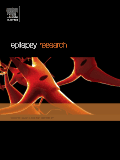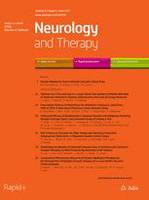
EPILEPSIA
Scope & Guideline
Pioneering insights for better patient outcomes.
Introduction
Aims and Scopes
- Clinical Research and Trials:
The journal publishes studies on the efficacy and safety of new and existing antiseizure medications, surgical interventions, and other treatment modalities, emphasizing evidence from clinical trials. - Neurophysiology and Biomarkers:
Research on electroencephalographic (EEG) patterns, biomarkers, and neuroimaging techniques to enhance the understanding of seizure mechanisms and predict surgical outcomes is a significant focus. - Genetics and Epigenetics:
There is a strong emphasis on the genetic underpinnings of epilepsy, including studies on genetic variants, their phenotypic expressions, and implications for precision medicine. - Pediatric and Adolescent Epilepsy:
The journal addresses the unique challenges and treatment options for epilepsy in children and adolescents, with a focus on developmental and epileptic encephalopathies. - Psychosocial Aspects and Quality of Life:
Research exploring the impact of epilepsy on mental health, quality of life, and the social stigma associated with the condition is regularly featured. - Innovative Technologies and Approaches:
The journal includes studies on the use of wearable devices, artificial intelligence, and telemedicine in the management and monitoring of epilepsy.
Trending and Emerging
- Precision Medicine and Genetic Testing:
There is a growing emphasis on tailored treatment approaches based on genetic testing, with studies investigating the implications of specific genetic variants on treatment efficacy and outcomes. - Wearable Technology and Remote Monitoring:
Research on the use of wearable devices for seizure detection and monitoring has surged, highlighting the potential for technology to enhance patient care and management. - Neuroinflammation and Immune Mechanisms:
Emerging studies are focusing on the role of neuroinflammation and immune responses in the pathogenesis of epilepsy, paving the way for novel therapeutic strategies. - Psychogenic Non-Epileptic Seizures (PNES):
There is an increasing interest in understanding and treating PNES, with a focus on the psychosocial dimensions and interventions that can improve patient outcomes. - Long-Term Outcomes and Quality of Life Studies:
Research examining the long-term effects of epilepsy treatments on quality of life and psychosocial well-being is gaining prominence, addressing the holistic needs of patients.
Declining or Waning
- Generalized Epilepsy Research:
There has been a noticeable decrease in studies focusing exclusively on generalized epilepsy syndromes, suggesting a shift towards more specific or complex forms of epilepsy. - Traditional Pharmacological Approaches:
Research centered around older antiseizure medications is declining, possibly due to the increasing interest in novel therapies and personalized medicine. - Surgical Techniques in Established Epilepsy:
Publications detailing traditional surgical techniques for epilepsy management are less frequent, as the field moves towards innovative and less invasive methods. - Epidemiological Studies:
Studies focused solely on the epidemiology of epilepsy, without a direct link to treatment outcomes or interventions, appear to be less prominent in recent issues. - Longitudinal Studies without Interventions:
There is a decrease in longitudinal studies that do not assess interventions or treatment changes, potentially due to a growing emphasis on actionable research.
Similar Journals

BRAIN & DEVELOPMENT
Fostering Innovation in Pediatric Brain HealthBRAIN & DEVELOPMENT is a prestigious academic journal published by ELSEVIER, renowned for its pivotal contributions to the fields of developmental neuroscience, neurology, and pediatrics. Established in 1979, this journal has become an essential resource for researchers and clinicians alike, as it explores the complexities of brain development and associated neurological disorders in children. With an impactful focus on advancing scientific understanding, BRAIN & DEVELOPMENT is currently ranked in the Q3 quartile in Developmental Neuroscience and Clinical Neurology and Q2 in Pediatrics, reflecting its significance within the medical community. Its ISSN 0387-7604 and E-ISSN 1872-7131 underline its established presence in academic literature. While the journal does not offer open access options, it continues to be a key platform for disseminating new research findings and fostering innovation in the understanding of pediatric neurological health. The journal's commitment to quality research is further evidenced by its ongoing publication trajectory up until 2024, making it a vital source of knowledge for students, professionals, and educators in related fields.

Journal of Pediatric Epilepsy
Illuminating the path to better care for children with epilepsy.The Journal of Pediatric Epilepsy, published by GEORG THIEME VERLAG KG, is a dedicated platform for advancing the understanding and treatment of pediatric epilepsy. With ISSN 2146-457X and E-ISSN 2146-4588, this journal provides vital insights and research findings relevant to clinicians, researchers, and students in the fields of neurology, pediatrics, and psychiatry. Although its coverage in Scopus was discontinued from 2012 to 2015, the journal continues to contribute to the body of knowledge within this critical area by focusing on novel therapeutic strategies, clinical studies, and case reports that address the unique challenges faced by children with epilepsy. The journal is committed to fostering collaboration and innovation in the treatment of pediatric seizure disorders, making it an essential resource for anyone dedicated to improving outcomes in this vulnerable population.

NEUROMUSCULAR DISORDERS
Pioneering research for better patient outcomes.NEUROMUSCULAR DISORDERS is a premier academic journal published by PERGAMON-ELSEVIER SCIENCE LTD, focusing on the latest research and developments in the fields of neurology, genetics, and pediatric health. With an ISSN of 0960-8966 and an E-ISSN of 1873-2364, this journal has established a significant presence since its inception in 1991, and it continues to contribute to the scientific community with its impactful findings and reviews. The journal boasts a commendable impact factor, reflected in its placement in the Q2 category for Clinical Genetics and Neurology, as well as its positioning in the top tier Q1 for Pediatrics, Perinatology and Child Health according to the latest quartile assessments. With Scopus rankings such as Rank #71/330 in Pediatrics and Rank #51/99 in Clinical Genetics, NEUROMUSCULAR DISORDERS is recognized for its contribution to advancing knowledge in neuromuscular diseases. The journal is essential for researchers, clinicians, and students interested in the intricate relationship between genetics and neurological disorders, providing valuable insights that drive innovation and improve patient care.

Current Problems in Pediatric and Adolescent Health Care
Shaping evidence-based practices in pediatric health.Current Problems in Pediatric and Adolescent Health Care is a distinguished peer-reviewed journal published by Elsevier Science Inc, dedicated to advancing the field of pediatric and adolescent health. With an impressive Impact Factor indicative of its relevance—ranking in the 79th percentile in its category and classified in Q2—this journal serves as a vital resource for healthcare professionals, researchers, and students. Covering a wide range of topics from clinical practice to innovative research findings in pediatrics, this scholarly publication is essential for those involved in optimizing health care for children and adolescents. The journal's comprehensive articles and reviews from 1996 to present reflect the evolving landscape of child health, making it a key contributor to evidence-based practice and policy-making in the United States and beyond. While the journal is not open access, readers gain invaluable insights to further their knowledge and improve healthcare outcomes for the younger population.

Acta Epileptologica
Transforming epilepsy research through open access.Acta Epileptologica is a prominent open-access journal published by SPRINGERNATURE, dedicated to advancing research in the fields of neurology and clinical neurology. With its ISSN 2096-9384 and E-ISSN 2524-4434, this journal has established itself as a key resource for researchers and practitioners worldwide, particularly since its transition to open access in 2019. Based in the United Kingdom, Acta Epileptologica aims to disseminate high-quality research and foster scholarly collaboration, as evidenced by its consistent Q3 ranking in both neurology and clinical neurology categories as of 2023. Although currently positioned in the lower percentiles on Scopus, the journal plays a critical role in exploring emerging trends and novel therapeutic approaches in epilepsy research, making it an essential platform for academics, healthcare professionals, and students deeply invested in the evolving landscape of neurological disorders.

Archives of Epilepsy
Innovating insights into epilepsy and patient outcomes.Archives of Epilepsy is a pioneering academic journal dedicated to advancing the field of epilepsy research and clinical practice. Published by GALENOS PUBL HOUSE in Turkey, this Open Access journal has embraced the principle of unrestricted access since its inception in 2012, allowing researchers, healthcare professionals, and students from around the world to engage with cutting-edge findings in neuropathology. With a focus on clinical and neuroscience aspects of neurology, the journal occupies a significant position in the academic landscape, currently ranked in the Q4 quartile in both Neurology and Clinical Neurology categories as of 2023. Though it faces challenges in its Scopus rankings with a current percentile of 2nd in Medicine - Neurology (Clinical) and 1st in Neuroscience - Neurology, it offers a valuable platform for emerging studies. The journal's commitment to fostering a comprehensive understanding of epilepsy is crucial, as it facilitates broader discourse on effective treatments and patient care strategies. We invite researchers and practitioners to explore the impactful articles published in the Archives of Epilepsy and contribute to an evolving dialogue that strives to improve outcomes for individuals affected by epilepsy.

PRACTICAL NEUROLOGY
Innovating Approaches to Neurological ConditionsPRACTICAL NEUROLOGY, published by the esteemed BMJ PUBLISHING GROUP, is a prominent journal in the fields of neurology and medicine, significantly impacting clinical practice since its inception in 2001. With an ISSN of 1474-7758 and an e-ISSN of 1474-7766, this UK-based journal reaches a diverse audience of researchers, clinicians, and students who seek to advance their understanding of neurological conditions and patient care strategies. Ranked in the second quartile (Q2) in both the miscellaneous medicine and clinical neurology categories for 2023, and positioned in the 47th percentile among its peers, PRACTICAL NEUROLOGY provides a platform for high-quality research that bridges the gap between laboratory findings and clinical applications. The journal's commitment to disseminating valuable information through peer-reviewed articles ensures that readers are equipped with the latest insights and practical knowledge necessary for improving outcomes in neurology. While access options are not currently open, the journal remains a vital resource for professionals striving to stay at the forefront of neurological research and clinical practice.

EPILEPSY RESEARCH
Advancing knowledge in epilepsy and neurology.EPILEPSY RESEARCH is a distinguished journal published by Elsevier, focusing on the dynamic field of neurology with a specific emphasis on epilepsy and related neurological disorders. Since its inception in 1987, the journal has become a vital platform for disseminating cutting-edge research, contributing significantly to the understanding of epileptic conditions and their clinical implications. With an impactful presence in the academic community, EPILEPSY RESEARCH currently holds a 2023 Q2 ranking in both the Neurology and Clinical Neurology categories, reflecting its commitment to high-quality, peer-reviewed content. The journal is indexed in SCOPUS, Ranking #173/400 in Clinical Neurology and #91/192 in Neuroscience, ensuring widespread visibility and academic engagement. Although not an open access publication, it provides critical insights, findings, and reviews that are essential for researchers, clinicians, and students alike, fostering advancements in epilepsy research and treatment. For any inquiries, the journal is based at Radarweg 29, 1043 NX Amsterdam, Netherlands.

EPILEPSY & BEHAVIOR
Illuminating the complexities of epilepsy and behavior.EPILEPSY & BEHAVIOR is a premier journal dedicated to advancing the field of neurology and behavioral neuroscience, published by Academic Press Inc. Elsevier Science. With a focus on the complex interplay between epilepsy and behavioral disorders, this journal serves as a pivotal platform for researchers, clinicians, and educators alike. The journal holds a commendable position with a Q2 ranking in key categories such as Behavioral Neuroscience and Clinical Neurology, highlighting its influence and contributions to the scientific community. Notably, EPILEPSY & BEHAVIOR is indexed in Scopus, ranking in the top percentiles across various related fields, which underscores the quality and relevance of the research it publishes. As it navigates from its inception in 2000 to its ongoing work into 2024, the journal remains committed to disseminating high-quality research and insights that address critical issues in epilepsy and associated behavioral challenges, providing invaluable resources for ongoing education and innovation in the field.

Neurology and Therapy
Empowering Practitioners with the Latest in Neurology and TherapyNeurology and Therapy, published by SPRINGER LONDON LTD, stands as a pivotal platform for researchers and practitioners in the field of neurology and its therapeutic applications. This Open Access journal, active since 2012, facilitates the dissemination of innovative studies and cutting-edge findings aimed at improving neurological health. With an impressive ranking in the 2023 Scopus Rankings, where it holds a Q2 category in Neurology and a Q1 category in Clinical Neurology, it underscores its prominence in advancing neurological research. The journal's intriguing scope encompasses a wide-ranging exploration of neurological disorders, treatment methodologies, and healthcare strategies, making it a valuable resource for those vested in enhancing patient outcomes. With an appealing average impact factor, readers are encouraged to dive into the latest advancements and engage with the scholarly discussions that are shaping the future of neurology.